- Home
- William Maxwell
The Folded Leaf Page 2
The Folded Leaf Read online
Page 2
After a minute or two Spud’s eyes came to rest on the mournful figure of Andromache. The class went on without him. When they had finished the sentence about brave Oliver, they opened their books to page 32 and the paragraph dealing with the subjunctive.
3
The ringing, brief but terrible, reverberated throughout all the corridors at five minutes before the hour. After the first bell no one, not even Miss Frank, could prevent them from talking out loud or from yawning openly. They were permitted to stand in the aisles and stretch. The girls could pry open their compacts and, without fear of being reprimanded, apply spit to their bangs and rouge to their thin young cheeks. The boys could poke each other. Hurrying from the school library—second floor at the front of the building—to an algebra class or a civics class or gymnasium or hygiene or Spanish 2B or commercial geography, Adams could step on Catanzano’s heels, and if deFresne saw a friend climbing the stairs ahead of him, he could quietly insert a ruler between the familiar legs and so make them trip and sprawl. The relief this afforded was only partial and temporary. By the ringing of the second bell, they were once more in their seats. The door was again on the right, the windows on the left—unless, as occasionally happened, they were reversed—and the calendar hanging behind the teacher’s desk at the front of the room. The picture, of course, had been changed. It was sometimes King Lear’s daughter Cordelia, in white, taking leave of her two evil sisters; sometimes the chariot race from Ben-Hur. Or it might be some old monotonous ruin like the Parthenon, the temple at Paestum, the Roman Forum—they hardly noticed which, once they had settled down and become resigned to another hour of inactivity.
The ringing at five minutes to three in the afternoon was different. Although it was no louder than the others, it produced a nervous explosion, a discharge of every ounce of boredom, restlessness, and fidgeting stored up during the long school day. Classrooms were emptied and this time they did not fill up again. The doors of lockers were opened, revealing pictures of movie stars, football players, cartoons, and covers of College Humor. Books were tossed in blindly. Caps, plaid woolen scarves, and autographed yellow slickers were taken out.
They all had something to do, some place to go.
The Martin twins met at their lockers—second floor near the head of the center stairs—and parted again almost immediately. Elsa and her friend Hope Davison put on smocks and went down to the assembly hall where, with large brushes and buckets of paint, the stagecraft class was creating the seacoast of Illyria. Janet Martin went down the corridor to another stairway and out a side door of the building. When she appeared, Harry Hall left the cement pillar he was leaning against and came to meet her.
Carson and Lynch went to a movie on Western Avenue. It was called “The Downward Path” and a large sign outside the movie theater said no one under eighteen would be admitted. Carson and Lynch were only sixteen but they were large for their age. They stood and looked at the stills outside. Necking parties and girls half dressed, confronting their parents or the police. The blonde woman in the ticket booth accepted their two dimes without interest.
Rose Kromalny, whose family did not understand about art and music, waited for Miss Frank, to walk home with her.
The three boys who were trying out for assistant football manager met in Mr. Pritzker’s office at one end of the gymnasium and tried not to look at one another.
The crack R.O.T.C. squad, consisting of Cadet Corporal Cline and Cadets Helman, Pierce, Krasner, Beckert, Millard, Richardson, and Levy, appeared in the schoolyard, in uniform, and commenced drilling. As always, there were those who stayed to watch.
There was a Junior Council meeting in Room 302 and a meeting of the business staff of The Quorum in 109. The Senior Sponsors held a brief meeting in the back of the assembly hall. The orchestra, as usual, practiced in 211. They had two new pieces: Mozart’s “Minuet in E Flat” and the “Norwegian Rustic March” by Grieg.
Spud Latham, who had nothing to do and was in no hurry to go home since it wasn’t home that he’d find when he got there, stood in front of his wooden locker and twiddled the dial. He was in the throes of another daydream. The school principal, on looking back over Spud’s grades, had discovered that there had been some mistake; that they should all have been S’s, not C’s and D’s. So he had the pleasure of coming home and announcing to his incredulous family that he was valedictorian of his class and the brightest student in the history of the school.
The pointer slipped by the last number of the combination and he had to work it over again. The second time he was successful. The locker flew open. His English grammar landed on the floor beside his gym shoes. He reached for his corduroy coat and, forgetting both the Latin reader and the textbook on plane geometry, closed the door of the locker. While he was moving the dial he glanced over his shoulder and saw a boy in a leather jerkin. The boy was waiting for him, apparently. For a moment Spud thought it was somebody he’d never seen before, but then he remembered. In the swimming pool when they were playing water polo. The kid who didn’t have sense enough to let go of the ball….
Spud turned quickly and walked away.
4
The way home from school led Lymie Peters past LeClerc’s pastry shop. Without turning his head he looked in and saw Mark Wheeler in a coonskin coat, although the weather was mild, and Bea Crowley and Sylvia Farrell, who were trying to make a brown-and-white fox terrier sit up and beg for peanut brittle. And Bob Edwards, and Peggy Johnston, standing next to him in a dark red dress with a wide black patent leather belt. And Janet Martin and Harry Hall, sitting side by side, their hands almost touching, on a dead radiator.
There were a lot of others at LeClerc’s that afternoon. Lester Adams, Barbara Blaisdell or a girl who looked like Barbara Blaisdell, Bud Griesenauer, and Elwyn Glazer were standing in one little group. Beyond their group was another one. A third group was over by the counter. In the eleven or twelve steps that it took Lymie to pass the shop window, he saw them all, including Mrs. LeClerc with her dark skin and her polished black hair. Other parts of his long walk home were accomplished miraculously, without his hearing or perceiving a single detail of all that was going on around him. He made his way blindly across busy intersections. Streetcars, taxicabs, and double-decker busses passed unseen before his eyes. Signboards, filling stations, real estate offices he ignored. He went under the elevated and came out again without knowing it. But LeClerc’s was something else again. The girls in LeClerc’s were like wonderful tropical birds, like parrots and flamingos, like the green jungle fowl of Java, the ibis, the cockatoo, and the crested crane. They may possibly have realized this themselves. At all events, their voices were harsh and their laughter unkind. They parted their hair in the middle sometimes, sometimes on the side, and encouraged it to fall in a single point on their cheeks. Their dresses were simple and right for school, but came nevertheless from Marshall Field’s or Mandel Brothers, never the Boston Store or The Fair. And their eyes, framed in mascara, knew everything.
The boys who hung out at LeClerc’s had broad shoulders, or if they didn’t, the padding in their coats took care of it. They wore plus fours as a rule, but some of them wore plus eights. Their legs were well shaped. Their bow ties were real and not attached to a piece of black elastic, like Lymie’s. The little caps that clung to the backs of their heads matched the herringbone or the basket weave of their very light, their almost white suits. They had at their disposal a set of remarks which they could use over and over again, and the fact that there were a great many things in the world about which they had no knowledge and no experience did not trouble them.
The year before, they went to a Greek confectionery half a block up the street. Although the food in the school lunchroom was cheaper and more nourishing, so many of them insisted on eating at Nick’s at noon that getting in and out of the door could only be achieved through force of character. You had to brace yourself and then shove and squirm and have friends make a place for you so that, together, y
ou could elbow your way up to the counter. Once there, if you were lucky or if you had the kind of voice that outshouts other voices, you might come away with a bottle of milk and a ham sandwich or a cinnamon bun. But in the spring something (the same instinct, could it have been, that governs the migrations of starlings?) caused them to abandon the Greek confectionery and settle in LeClerc’s, which was even smaller. Here every afternoon were to be found all the girls who never made the honor society or served as Senior Sponsors or took part in dramatics or played the viola; and yet who were, Lymie couldn’t help noticing, so much better looking than the ones who did.
In the late afternoon LeClerc’s was seldom overcrowded. If Lymie had pushed the door open and walked in, nobody would have indicated any surprise at seeing him. Mark Wheeler would have said “Hi there,” over the heads of several people, and Peggy Johnston, who was in his division room, would probably have smiled at him. Her smile seemed to mean more than it did actually, but there were others. There were undoubtedly three or four groups he could have stood on the outside of, without anybody’s minding it. After all, that was how it was done. Ray Snyder and Irma Hartnell and Lester Adams had all had to stand around on the outside before they were taken in. But Lymie didn’t try.
He was too proud perhaps and at the same time too uncertain of himself. The fact that his legs were too thin for him to wear knickers may have had something to do with it; or that he had no set of remarks. Also, the one time that he had screwed up his courage to ask a girl for a date, she had refused him. Considering how popular Peggy Johnston was, he should have asked her at least two days before he did. She said she was awfully sorry but she was going to the Edgewater Beach Hotel that night with Bob Edwards, and Lymie believed her. It wasn’t that he doubted her word. But deep down inside of him he knew as he hung up the phone what would have happened if he’d called earlier. And because he still carried that heavy knowledge around with him, when he got abreast of LeClerc’s big plate glass window he looked in and saw everything there was to see but kept right on walking.
Perhaps it was just as well; Lymie was only fifteen.
But why, since he was so proud and in many ways older than his years, did he let himself be drawn into the Venetian Candy Shop farther up the street and come out half a minute later with a large red taffy apple and proceed to smear his whole face up with it, in public, walking along the street?
5
Mrs. Latham reached up and turned on the bridge lamp at her elbow, though it was still daylight outside, and the lamplight fell upon her lap, which was overflowing with curtain material. There were piles of it on the sofa and on the floor around her, and it was hard to believe all this white net could hang from the four living room windows that now were bare and looked out on a park.
She sat with her back not quite touching the back of the big upholstered chair and her head bent over her sewing. In shadow her face was expressive and full of character but when the light shone directly on it, although the features remained the same, it seemed wan. It was the face of a woman who might be unwell. Her soft brown hair had very little gray in it and was done on top of her head in a way that had been fashionable when she was a girl. Anyone coming into the room and seeing her there in the pale yellow light would have found her very sympathetic, very appealing. Without having the least idea what was in her mind as she raised the spool to her lips and bit through the white cotton thread, he would have felt sure that she had been through a great deal; that she had given herself heart and soul to undertakings which ought to have turned out well but hadn’t always; and that she was still, in all probability, an innocent person.
Near the center of the park—it was no more than an open field with young elm trees set at regular intervals around the edge—boys were playing touchball. Their voices penetrated to the living room, through the closed windows. Mrs. Latham may or may not have heard them; she did not commit herself. A bakery truck passed in the street, and several cars, one of them choking and sputtering. The sound of footsteps on the cement walk caused Mrs. Latham to raise her head and listen. Whoever it was that she was expecting, this couldn’t have been the one, for she went back to her sewing immediately and did not even bother to look out.
In spite of the solid row of front windows, the living room was dark. It was the fault of the wallpaper and of the furniture, which had obviously been acquired over many years, at no great expense, and perhaps even accidentally. There was barely enough of it here and there in the room to make it livable. A plain grayish-blue rug covered most of the floor. The sofa and the chair Mrs. Latham sat in were upholstered in a subdued green. There was a phonograph and three wooden chairs, none of them wholly comfortable. The table was mission, with a piece of Chinese embroidery for a runner, and a pottery lamp with a brown shade. Also a round ashtray with cigar bands glued in a garish wheel to the underside of the glass, and a small brass bowl. The bowl was for calling cards. It had nothing in it now but a key (to a trunk possibly, or to the storeroom in the basement) and thumbtacks. On the shelf under the table were two books, an album partly filled with snapshots and a somewhat larger one containing views in color of the Wisconsin Dells.
The opposite wall of the living room was broken by a fireplace of smooth green tile made to look like bricks. The gas log had at one time or other been used. It was not lit now. At either end of the mantelpiece were two thin brass candlesticks, each holding a battered blue candle. Between them hung a framed sepia engraving of an English cottage at twilight. The cottage had a high thatched roof and was surrounded by ancient willow trees. The only other picture in the room hung at eye level above the sofa. It was a color print of a young girl, her head wound round with a turban, a sweet simpering expression on her face, and (surprisingly) one breast exposed.
Beyond the living room was the hall, with the front door bolted and chained, and then a rickety telephone stand. On the right was a door with a full-length mirror set into it, and another door that opened into Mr. and Mrs. Latham’s bedroom. The hall opened into the dining room, which had two large windows looking out on a blank wall (this was not the apartment Mrs. Latham would have chosen if they’d had all the money in the world) and was a trifle too narrow for anyone to pass easily between the table and the sideboard at mealtime. In the center of the dining room table, on a crocheted doily, was a small house plant, a Brazilian violet which showed no sign of blooming.
After the dining room came the kitchen, and right beside it a bedroom—a girl’s room by the look of the dressing table and the white painted bed. On the dressing table there was a letter. The room had a single window and French doors at the far end. The curtains must have been intended originally for some other room than this, since they did not quite reach the window sill. They were organdy and had ruffles. The glass in the French doors was covered with white net.
It was easy to guess that the door in the hall, the one with the mirror set into it, would, if opened, have revealed a closet. But these two French doors were tightly shut and without the help of Mrs. Latham there would have been no telling what lay beyond them. When the street lamps were turned on outside, something prompted her to stand up, brush the threads from her lap, and walk back here. She put her hand on a glass knob and turned it slowly. The door opened, revealing a boy’s body lying fully clothed except for shoes, on a cot that was too small for it. The position—knees bent awkwardly, right arm dangling in space—seemed too inert for sleep. It looked rather as if he had a short time before been blindfolded and led out here to meet a firing squad. But such things seldom happen on a sleeping porch, which this clearly was, and besides, there was no wound.
6
When Mrs. Latham spread a blanket over Spud he turned and lay on his back. His face, freed for the time being of both suspicion and misery, was turned toward the ceiling.
It was too bad, Mrs. Latham thought as she bent over him, it was a great pity that they had to leave Wisconsin where they knew everybody and the children had so many friends. But at least
Evans had been able to find another job. That wasn’t ah ways easy for a man his age. And in time he’d probably get a raise, like they promised him, and be making the same salary he had been making before. The children were still young. They’d have to learn to make new friends, and be adaptable.
She raised one of the windows a few inches and then closed the door behind her softly.

 The Chateau
The Chateau Time Will Darken It Time Will Darken It
Time Will Darken It Time Will Darken It The Heavenly Tenants
The Heavenly Tenants They Came Like Swallows
They Came Like Swallows So Long, See You Tomorrow
So Long, See You Tomorrow The Folded Leaf
The Folded Leaf All the Days and Nights
All the Days and Nights Time Will Darken It
Time Will Darken It Ancestors
Ancestors